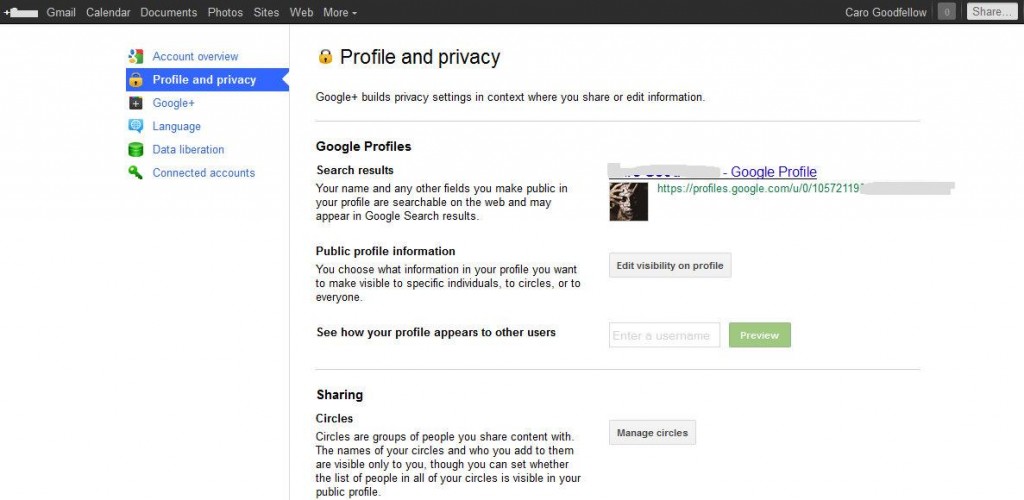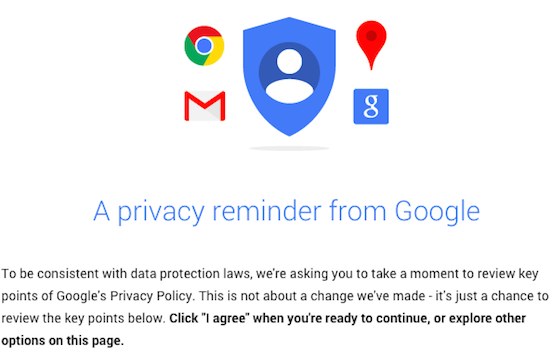

That would be a reputation management tool surely appreciated by many (but also one that could be used against you if it allowed anyone to do a search of your face). I asked when the company might offer a "Find My Face" product that searches the World Wide Web rather than just friends' photos on Google+. (I shivered at that one, as it sounds a little like a product that could be named "Corpse Search.") "Someone could upload a photo of a loved one and search news coverage to see if there are any images of them," he said. As for future plans, he mentioned possible disaster relief uses. For instance, I could use my Google plus account to share photos and videos out. "We don't want to deploy these technologies until we think they're ready and the privacy protections are in place," said Petrosky. With all the flak Google is facing with respect to privacy in Europe. Company executives have previously said that Google could have included identity searching in Google Goggles, allowing users to take a photo of someone and then have Google search for that person's name. Google Photos is now experimenting with more powerful search. Petrosky said the company is generally being very careful about rolling out facial recognition. "The face model is deleted and no more tag suggestions will be made," said Petrosky.

If you decide you want out, you can turn the feature off. You can also block someone by placing them in your Blocked circle while editing your circles, via the drop-down arrow at the top of one of their posts, or by clicking Block in a notification email you received from that person.

(I haven't been able to test it out yet.) On the side of the profile, click Block person’s name Confirm that you want to block that person. They're rolling out the feature slowly it may take a week or so until it's available to all users. This article was originally published at 10:35 a.m.When I questioned basing who you know visually on who you e-mail (which may include people whose faces you've never seen), the Google team emphasized that mutual circling will be the main factor. The Senate is slated to hold hearings on stricter privacy laws p.m.: This article was updated with additional analysis.ġ0:40 a.m.: This article was updated with information about the Wall Street Journal report. Google Chief Executive Officer Sundar Pichai has agreed to appear at a House Judiciary Committee hearing later this year over concerns of privacy, bias in search results and anticompetitive practices.
Google plus photo privacy series#
The death of Google+ and news of its privacy issues come as major tech companies face increased scrutiny over their handling of user data, and just 10 days after Facebook announced that a similar series of interlocking bugs allowed for a massive user data breach. Advertising constitutes the vast majority of both companies’ business, with 86% of Alphabet’s and 98% of Facebook’s revenues in the second quarter of 2018 coming from ad sales. The company built Google+ as a competitor to Facebook, hoping to gain access to the rich troves of data that users generate about themselves on social networks. Users also filed a class-action suit against the company, resulting in an $8.5-million settlement.Īn earlier Google social network called Orkut launched in 2004 and gained a mass user base in India and Brazil by the late 2000s, but was ultimately shut down in September 2014.īefore its launch, more than 1,000 Google employees were on the Google+ project staff. Google ultimately settled with the FTC, agreeing to regular privacy audits through 2030.
Google plus photo privacy tv#
Built right into your smart TV or streaming device, Google TV is your. The Gmail-integrated Google Buzz was dogged by privacy concerns within days of its 2010 debut, leading the Federal Trade Commission to file charges against the company, alleging that it had violated its own privacy policies and deceived users into joining the social network. Your favorite streaming apps for movies, shows, live TV, and more, on one platform. The demise of Google+, which was launched in 2011, is just Google’s latest social network to limp into the grave. The company said that it kept only two weeks’ worth of data logs on who had accessed the buggy Google+ interface, so it could not confirm which users were affected or whether the error was even exploited. Forgot email CAPTCHA image of text used to distinguish humans from robots. was coming under fire for not preventing the data firm Cambridge Analytica from accessing troves of user information. According to the report, a memo that Google’s legal team prepared for senior executives said that going public with the breach would likely trigger “immediate regulatory interest” at a time when Facebook Inc.


 0 kommentar(er)
0 kommentar(er)
